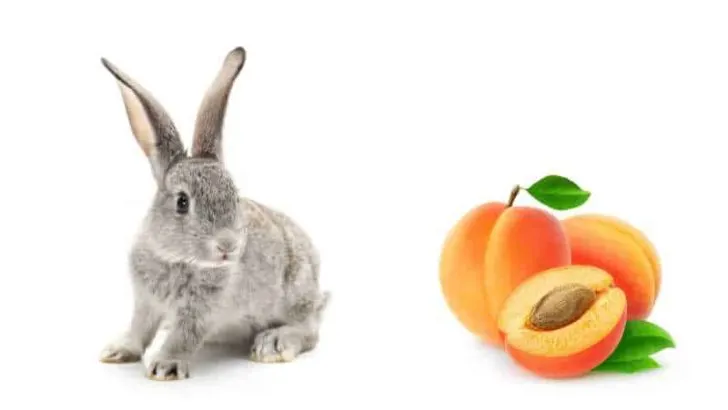When you want to freshen up, snacking on fruit should be among your first choices. But if you have a pet – a rabbit, in this case – you must’ve been wondering if it can take a bite, too.
It’s fruit season, so it doesn’t hurt to ask can rabbits eat apricots?
Well, yes, it’s safe to feed your rabbit apricots, but you should know that there’s a limit you need to respect – primarily for health reasons.
So, if you want to read about the rules – and benefits – of feeding your rabbit apricots, scroll down!
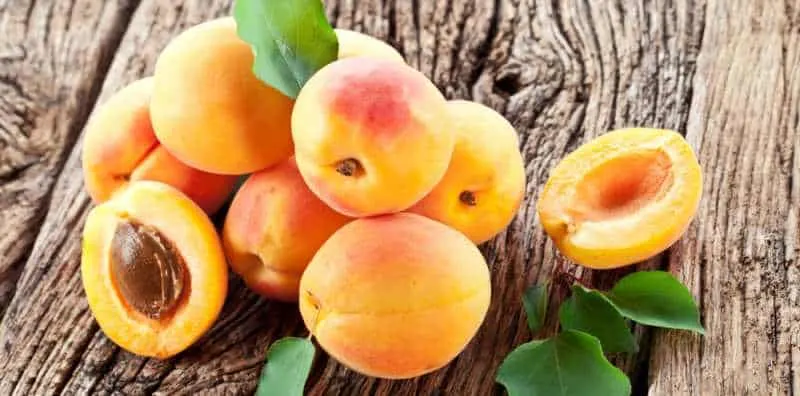
Make Apricots A Weekly Snack
Apricots are not only good for you; they can be a healthy snack for your pet rabbit, too. However, this is not something that belongs on the list of everyday rabbit food.
According to experts, you can give apricots to your rabbit no more than twice a week.
So, it’s best to make a delicious weekly snack for your bunny out of this juicy fruit.
Nutritional Value Of One Fresh Apricot
When choosing food for your fluffy pet, you must ensure that it includes healthy nutrients that will not bring health hazards.
So, before you head to the local market, take a look at what one whole fresh apricot contains nutrition-wise:
| Calories: | 17 |
| Protein: | 1 gram |
| Fat: | 0 grams |
| Carbs: | 4 grams |
| Fiber: | 1 gram |
| Sugar: | 3 grams |
| Cholesterol: | 0 milligrams |
| Sodium: | 0 milligrams |
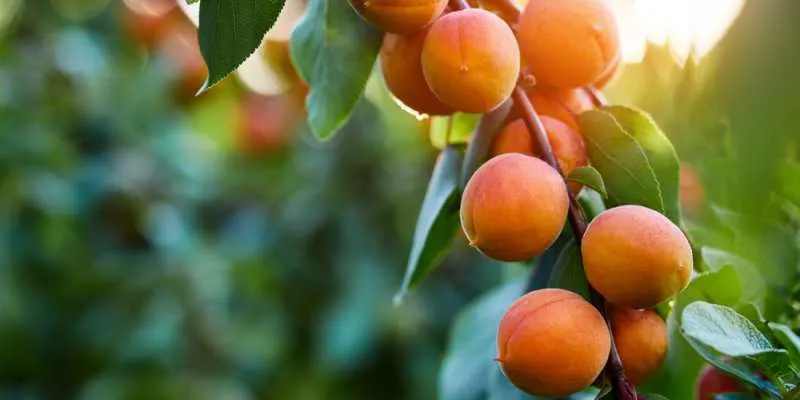
The Good In Apricots
If you give them to your rabbit in the allowed weekly doses and serve them properly, apricots can bring many health benefits. Since the health of your rabbit is obviously in the first place, let’s take a look at how eating apricots twice a week can contribute to this:
High Levels Of Fiber
Because apricots are rich in fibers, they are famous for their laxative properties. What does this mean, and how can it benefit your pet rabbit?
It means that this fruit is generally recommended to those who have a problem with constipation. The juices released by the apricots and the high levels of dietary fiber stimulate the digestive system and promote healthy bowel movements.
That can mean a lot to your rabbit, especially if it has recently eaten some “bad” foods and has shown constipation and stomach pain signs.
Promote Bone Health
Rabbits are smaller animals, and maintaining bone strength is vital for this species. Luckily, apricots are rich in calcium which automatically promotes bone health.
You’ll also hear that some experts recommend giving apricots to baby rabbits to prevent their bones from breaking. It’s true; you can do this in much smaller quantities since we’re still talking about babies – and not fully-grown rabbits.
Copper and iron, also present in apricots, will protect your bunny from potential age-related bone conditions, too.
Improving Metabolism
It’s certainly not the first time you’ve heard that fruits such as apricots and berries are recommended to your pet for improving their metabolism.
When given in moderate amounts, apricots can help a lot.
They’re rich in vitamin C and potassium, and their consumption can contribute to easier digestion, reduce cramps, and promotes proper blood flow.
Promote Good Vision
Your rabbit needs something to help it see better in the dark – especially if you like to let it run around the yard in the evening.
With age, vision is usually significantly impaired. Your rabbit needs something that will slow down the process of vision deterioration and save your pet from potential blindness.
Apricots are a good choice because they’re rich in Vitamin A and E. Of course, this benefit is especially emphasized when it comes to a senior rabbit.
Anti-Inflammatory Purposes
If you’re a rabbit owner, you know that their skin is susceptible to external influences and can easily develop infections and rashes.
With that in mind, feeding your pet rabbit apricots two times a week can significantly help in reducing inflammation and other skin conditions.
If your rabbit turns out to be allergic to some food it’s eaten recently, and this has affected its skin, don’t bother buying expensive medicine – chop a few slices of apricots instead.
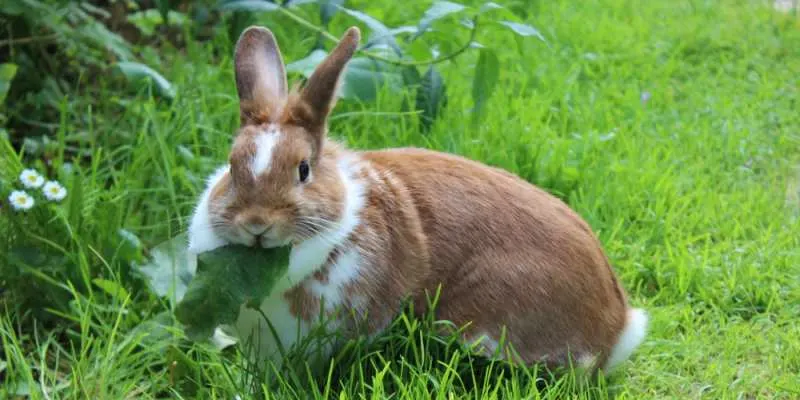
Watch Out For Pits And Leaves!
Properly cut apricots are a healthy choice – but take good care of the leaves and pits. These two should never end up on your rabbit’s menu!
Apricot pits are toxic to pets, including rabbits, and consuming them can lead to several side effects. In the worst case, you could be looking at death by poisoning.
Pretty much the same thing applies to apricot leaves. If you picked them yourself and didn’t buy them at the market, the chances are high that you plucked them together with the leaves.
The thing is, rabbits are allowed to eat certain greens and leaves – but this is not one of them. Apricot leaves and twigs are not recommended as food for your rabbit, and before you serve them, you should clean them thoroughly.
Read also: Can Rabbits Eat Parsley?
The Danger Of Cyanide Poisoning
Apricot kernels might seem harmless, but excessive consumption could cause acute cyanide poisoning.
Cyanide is a chemical consisting of carbon-nitrogen. If you’ve watched enough movies and crime thrillers, then you probably know that large amounts of this substance are fatal.
That’s exactly what we want to warn you about when you decide to feed your rabbits apricots:
Be sure to throw away the kernels!
In case your rabbit gets hold of this small piece of fruit – pit and all – pay attention to whether it displays some of the following symptoms:
- Weakness
- Drastic changes in behavior
- Shortness of breath
- Fainting
- Coughing
- Seizures
- Coma
Important: You CAN NOT treat cyanide poisoning at home. If you’ve noticed some of the symptoms, call Animal Poison Control and take your rabbit to the vet IMMEDIATELY.
Cyanide poisoning is very easy to spot and progresses quickly, so time is of the essence.
How To Treat Cyanide Poisoning?
Since you don’t have much power when it comes to cyanide poisoning, all you can do is take your pet rabbit to the vet and administer medication if prescribed any.
Since cyanide negatively affects oxygen intake, the vet will probably have to administer 100% oxygen.
The severity of the case depends on the amount your rabbit has eaten.
In most cases, this is resolved by medication, and you will generally be expected to take good care of your bunny after the vet appointment is over. Also, this might involve minor changes in diet.
What Are Some Other Sources Of Cyanide?
Unfortunately, traces of cyanide are not only found in apricot kernels. This deadly chemical can also be found in:
- Synthetic plastic
- Cassava potatoes
- Cigarette smoke
So, in addition to taking care of what your rabbit eats on a daily basis, you need to pay attention to the environment – and whether it is harmful to its health in any way.
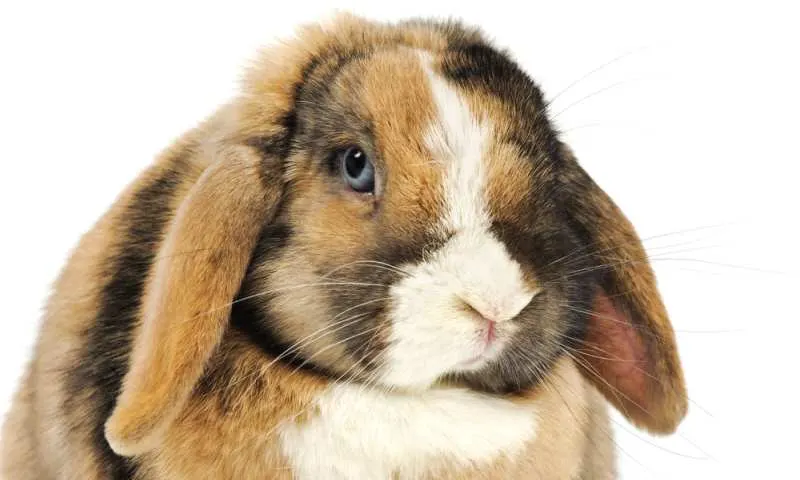
Too Many Apricots Cause Diarrhea
As with many other foods, large amounts of apricots can cause diarrhea in rabbits. That’s a relatively common side-effect – but there are quick and effective ways to deal with it.
As a cautious owner, you should provide your rabbit with immediate care. If you’re unsure what to do, and this is the first time your bunny has diarrhea, take it to the vet and ask for advice regarding further treatment.
Your veterinarian will also prescribe the medication you will need to give to your rabbit for the next few days to manage the symptoms.
Obviously, you should never buy medication on your own.
Treating diarrhea mainly consists of including more fluids and greens in your rabbit’s diet. Over the next few days, make sure you regularly visit your rabbit’s cage and refill its water bowl.
Also, don’t forget the greens – they are a natural remedy for stomach problems!
If your rabbit has diarrhea and it’s refusing to eat, the situation is a bit more serious. There’s often an underlying problem and a more severe illness, and you should take your rabbit to do a couple of tests ASAP.
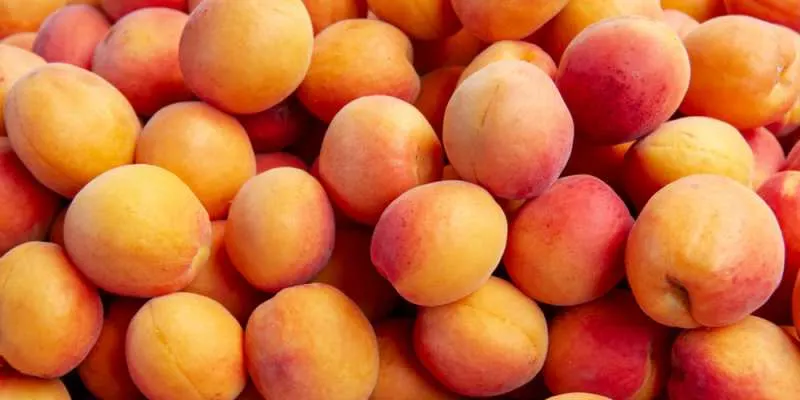
Summing Up
Great news for anyone wondering can rabbits eat apricots!
We’ve concluded that rabbits are allowed to consume apricots – albeit not daily. It shouldn’t be a part of your rabbit’s everyday food, but it can be included as a healthy weekly snack.
Our advice is to give your rabbit apricots two times a week maximum! This fruit is juicy and soft, so your rabbit will not have problems snacking on it. However, too many apricots could cause diarrhea.
Generally speaking, apricots bring many health benefits. Moderate consumption can promote bone health, regular bowel movements, and even better vision.
However, you should be aware of apricot pits and leaves! These two are highly toxic, and if your rabbit gets a hold of them, you’re looking at potential cyanide poisoning.
Learn More: What Can Rabbits Eat? The Entire Diet For Your Rabbit

